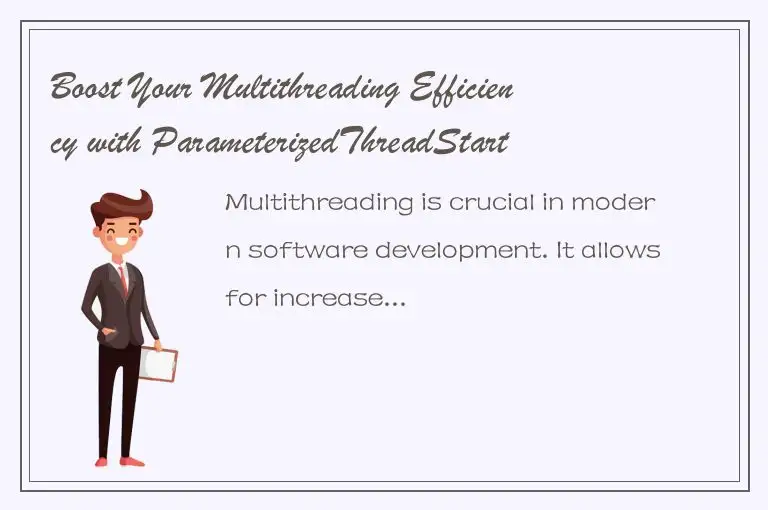Multithreading is crucial in modern software development. It allows for increased efficiency by utilizing multiple threads to accomplish tasks simultaneously. However, creating and managing threads can be a daunting task for developers. This is where the ParameterizedThreadStart delegates comes in to save the day.

The ParameterizedThreadStart delegate is a built-in .NET delegate that is specifically designed to facilitate the creation and management of threads. The delegate is similar to the ThreadStart delegate, except that it allows for the passing of arguments to the thread method.
In a nutshell, the ParameterizedThreadStart delegate enables developers to pass arguments to a thread method. This feature is particularly useful in scenarios where a method needs to be executed on a thread with certain sets of parameters.
To use the ParameterizedThreadStart delegate, you first need to create a method that the thread can execute. This method should take a single parameter of type Object. The Object parameter is used to pass arguments to the method.
Here’s an example of how to use the ParameterizedThreadStart delegate:
```
Thread thread = new Thread(new ParameterizedThreadStart(MyThreadMethod));
thread.Start(parameterObject);
```
In this example, MyThreadMethod is the method that will be executed on the new thread. The parameterObject argument is an Object that is passed as a parameter to MyThreadMethod.
```
private static void MyThreadMethod(object parameter)
{
// Do something with the parameter
}
```
This is the method that the ParameterizedThreadStart delegate will execute on a new thread. Note that it takes an object parameter.
By using the ParameterizedThreadStart delegate, you can avoid creating a separate class or struct to hold the parameters for a thread method. This saves time and code complexity.
Here’s an example of how you can use the ParameterizedThreadStart delegate to create a thread that generates a Fibonacci sequence:
```
public static void GenerateFibonacci(object limit)
{
int n = (int)limit; // Cast limit to an int
int a = 0;
int b = 1;
Console.Write("{0} {1}", a, b);
for (int i = 2; i < n; i++)
{
int c = a + b;
Console.Write(" {0}", c);
a = b;
b = c;
}
}
Thread thread = new Thread(new ParameterizedThreadStart(GenerateFibonacci));
thread.Start(10);
```
In this example, the GenerateFibonacci method takes a limit parameter, which determines the number of terms in the sequence to generate. The thread is created using the ParameterizedThreadStart delegate, and the limit parameter is passed as an argument.
The ParameterizedThreadStart delegate is a powerful tool that can significantly boost multithreading efficiency. It enables developers to pass arguments to thread methods without the need for a separate class or struct to hold the parameters.
However, it is important to note that the ParameterizedThreadStart delegate is not a silver bullet. You still need to be mindful of the potential for race conditions and other concurrency issues. It is important to properly synchronize your code to ensure thread safety.
In conclusion, the ParameterizedThreadStart delegate is a powerful and convenient tool for creating and managing threads with parameters. It saves time and code complexity by eliminating the need for a separate class or struct to hold parameters. However, it is important to use it responsibly and be mindful of concurrency issues.




 QQ客服专员
QQ客服专员 电话客服专员
电话客服专员